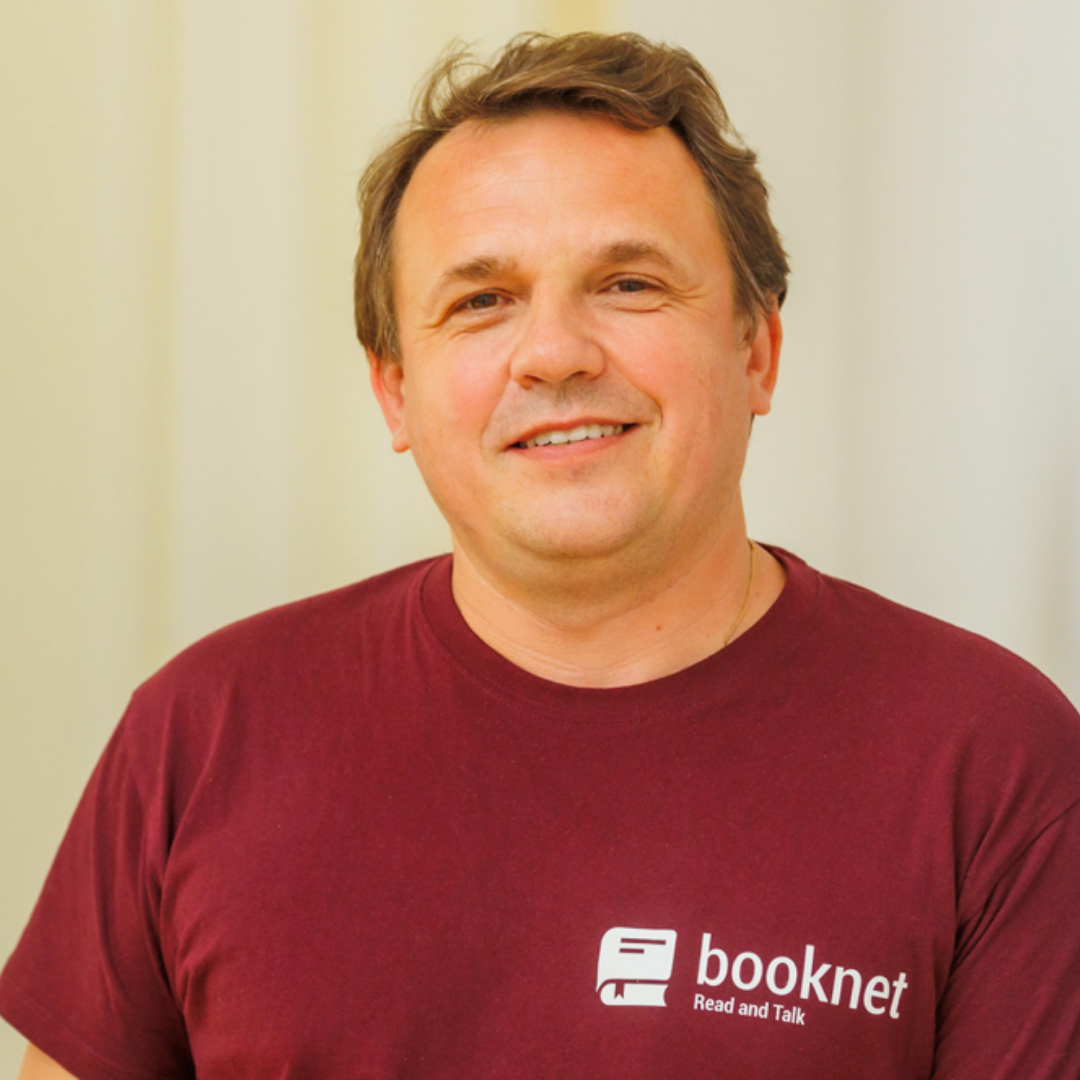
These startups are aiming for the title. They’ve already wowed the jury with their innovative and forward-looking ideas, but which one of them will be chosen as “Conten-Startup of the Year” on 17 October 2024?
Booknet makes it possible for authors to self-publish their work – with a unique twist. Writers can use the portal to publish a book while still in the process of writing it. In other words, readers subscribe to receive the latest chapter using a »bookscription model« that recalls how many renowned authors used to publish serial stories in journals and newspapers in centuries past. Still, as Booknet CEO Sergiy Grushko notes: »We figured out that a book’s success is very much dependent on which language the story was written in«. Indeed, stories written in English or Spanish are likely to have a much larger readership than those written in other languages.
In response, My BookNet Pro uses AI translations to help break down language barriers and make stories available to much larger audiences. In turn, this garners a more substantial income for authors. It allows authors to publish their work in their mother tongue and then use AI translation technology to make the books available to a global audience in several different languages.
In the field of self-publishing, there’s no longer any significant qualitative difference between human and AI-generated translations. Sergiy Grushko:

Photo: © Privat

Photo: © Manfred Burger
People unaffected by hearing impairment might not know that learning to read texts can be a challenging process for the deaf. Written German, for example, is a difficult foreign language to learn, as it is a form of spoken language and thus quite abstract for the deaf. The Vienna-based startup Equalizent has made it their mission to provide deaf people with barrier-free access to written texts. »Our team comes from the education sector and our work is based on over 20 years of experience in that field«, explains founder Georg Tschare. »And now, our goal is to enrich e-books with sign language the same way it’s being done with websites«.
In concrete terms, this means that users can click on words that are then depicted in German sign language (at the moment, Equalizent offers roughly 10,000 terms) in a manner similar to a conventional dictionary. Equalizent for e-books is still in a test phase, but it’s due to be launched on the market soon. And Tschare argues that time is running out for publishers, noting that Germany’s Accessibility Reinforcement Act (BFSG), which is set to come into force in 2025, also explicitly applies to e-books
We’re hoping the industry will recognise the potential of our solution and get involved in investing. Georg Tschare
Readers of popular literary series will be familiar with the sense of frustration that often sets in after they’ve finished the latest exciting instalment of a book, only to realise they’re going to have to wait forever for the sequel. This is where the interactive book format created by Gamebook Studio comes in, making it possible to bridge this time gap and even use it in an active manner. Gamebook plans to create what founder Ulrike Küchler calls an »ecosystem for the content sector«. All players in the book sector, including publishers, agencies, readers and authors, can use this ecosystem as a »digital hub«, with the interactive book format as its centrepiece.
In concrete terms, it means that readers themselves can become heroes in interactive stories, a practice long established in the games industry. With the help of video animations, they can slip into the shoes of existing characters, such as Frodo and Dr. Watson, and experience new stories with them. Using AI translation technology, this can also work on the international market. And, as Ulrike Küchler explains, the process is not time-intensive: »You can create an initial short story in less than 30 minutes«.
The reader’s emotional connection is intensified, which makes for a deeper experience of the world of their favourite stories. Ulrike Küchler

Photo: © Privat

Photo: © Kompreno
How cool would it be for readers to have relevant articles collected in one single app instead of having to subscribe to several different newspapers? The startup kompreno decided to tackle precisely this challenge and make the vision a reality. They’re now working in cooperation with 30 partners from 15 countries to provide readers with access to high-quality texts with no language barriers via one single digital access. The unique aspect of the service is that the AI-translated articles are drawn from a variety of international media and thus take into account diverse perspectives. As co-founder Jochen Adler explains: »We provide outstanding curated content that’s relevant all across Europe«.
The service is financed exclusively through reader subscriptions (starting at €19/month) rather than via advertising. Adler is confident this means »high-quality journalism will reach a readership that is willing to pay for it«. In terms of long-term goals, the kompreno team plans to work with schools and universities to promote democracy, but also with the book industry, especially in the realm of school books and non-fiction.
The whole world is talking about AI-generated fake news and the impact it’s having on our democracies. Jochen Adler
How can companies manage and process what feels like an unimaginable amount of data? Susanne Friese describes the challenge using the following example: »Let’s say your company has carried out 20 one-hour interviews. This means you’re likely to have roughly 400 pages of text«. Analysing all of this data is bound to be a time-consuming activity. »These days, a lot AI tools promise quick results, such as the automatic categorisation of data«, notes Friese. »But these categories often have to be reworked«.
And this is exactly where Friese’s startup comes into play: »The strength of the new technology is in the conversation, not in the categorisation«, she argues. In other words, with the help of advanced AI, Friese’s app QInsights makes it possible for recordings to be transcribed, customer data to be added for comparison and analyses to be carried out, including such things as theme extraction, customisable sentiment analyses and persona profiling. In terms of key players in the book industry, Qeludra is especially appealing for publishers that have a market research department.
The post-processing involved in many AI tools often cancels out any time you might have saved up until that point. Susanne Friese

Photo: © privat
This programme organised by the Börsenvereinsgruppe aims to bring startups together with established industry stalwarts so as to firmly anchor new and exciting innovations in the book sector.
The participating founders are given coaching sessions and take part in a co-creation workshop designed to test their business models together with industry representatives and also explore opportunities for cooperation.
The coaching sessions are managed by two industry experts, Harald Henzler (smart digits GmbH) and Okke Schlüter (Hochschule der Medien/University of Applied Sciences Stuttgart).
At the 2024 Frankfurt Book Fair, the five startups will compete in a final pitch event. After that, the jury will select the Content-Startup of the Year, which will receive a grant of €10,000.
The CONTENTshift competition is sponsored by companies active in the book industry, each of which sends a representative to sit on the jury. The members of this year’s jury are the following:
Text: Isabella Caldart